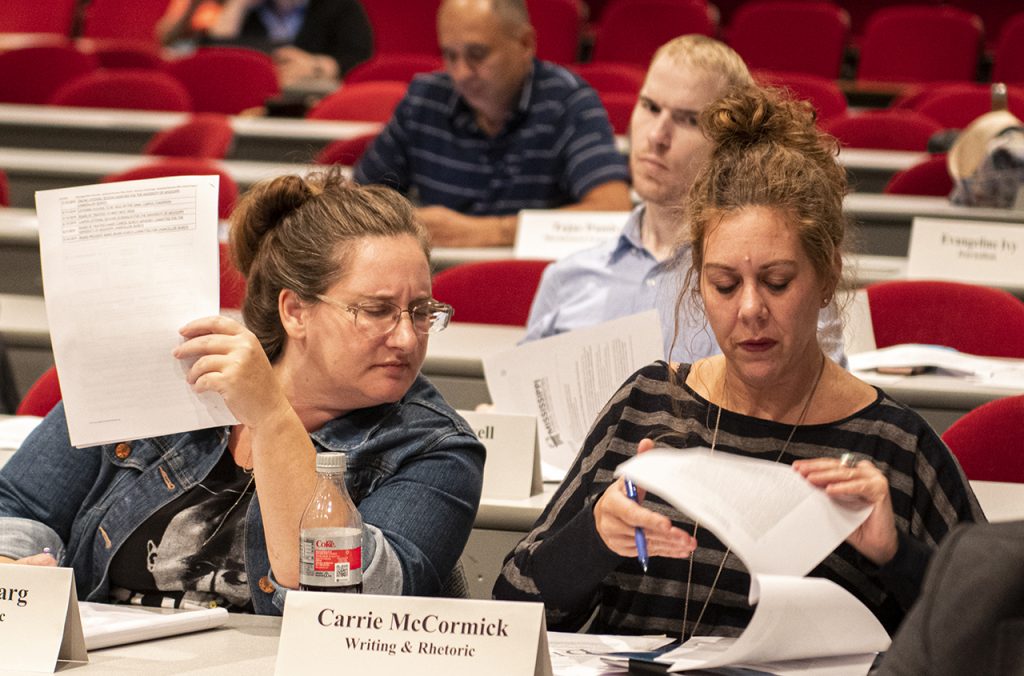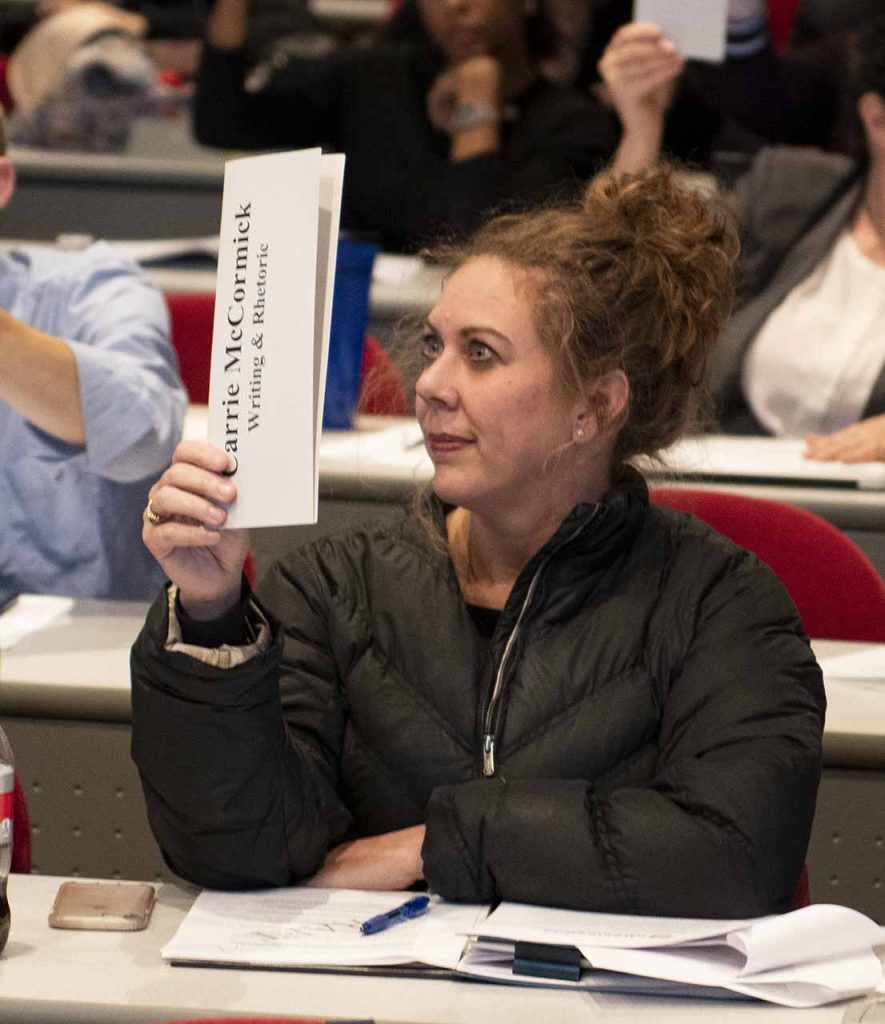
After deliberating for nearly three hours in executive session, the Faculty Senate voted to pass a resolution declaring no confidence in the Institutions of Higher Learning and in the chancellor selection process.
On Wednesday, the senate released two proposed resolutions to be considered at the special meeting on Thursday. One resolution called for a declaration of no confidence in the Institutions of Higher Learning and the appointment of Glenn Boyce, and the other called for a coalition of the post-secondary institutions governed by the IHL to initiate a constitutional amendment to abolish the IHL.
The language in the resolution passed by the senate on Thursday night is demonstrably different from the proposed resolutions that were released on Wednesday.
Because the senate discussed and voted upon the resolution in executive session, what was discussed in the meeting is confidential. However, Faculty Senate secretary Brice Noonan laid out three possible scenarios explaining why the language changed from the resolutions released on Wednesday to the finished product Thursday night.
“It could be that people considered that other one and didn’t like it and it’s been thrown away,” Noonan said. “It could be that it has not yet been discussed. It could be that it has been discussed but it has been tabled and will be discussed at a later date.”
The resolution does not mention Glenn Boyce specifically, but does mention “the appointment of a non-applicant who was serving as a paid consultant to the search process and who has close ties to the IHL Board creates the perception of impropriety on the part of the IHL Board.”
Noonan said the omission of Boyce’s name was intentional.
“There are a number of reasons that that would be, not the least of which (is), the faculty are going to be working with Dr. Boyce for some time to come,” Noonan said. “The dissatisfaction with Boyce is not necessarily due to any actions of his own. For the most part, it’s primarily, ‘We don’t trust or like the way the IHL did this, and for this reason, we don’t support its result.’”
Noonan added that the faculty in the biology department were happy with condemning the IHL but were “reluctant to make any statements about Boyce simply because they don’t know enough about him to say that they don’t have confidence or don’t want him as their leader.”
The vote tally was not made public following the meeting.
Ultimately, the senate opted for a less severe resolution in favor of one that emphasizes future collaboration with the IHL on personnel matters.
“The faculty (is) interested in working with the IHL. I see that as a way of reaching out to them to say, ‘Look, we’re really displeased with how things went,’ but I read that as, ‘We’d be happy to work with you and the other state Institutions of Higher Learning to ensure that this process can be done in a way that benefits everyone,’” Noonan said.
The resolution also criticizes the information the IHL released on Monday, seemingly in response to a faculty senate resolution passed on Oct. 8 that called for a complete accounting and detailed timeline of the chancellor search process. The resolution says that the board “failed to satisfactorily respond” to their resolution.
Thursday afternoon, the Institutions of Higher Learning released another statement that said they will review the search process “to determine ways that it can be improved.” They also said “it is unfortunate that the process has reflected negatively on the beginning of Dr. Boyce’s tenure.”
After beginning the meeting, senate chair Meagen Rosenthal read through the bylaws, reminding senators about the rules surrounding executive sessions. Senators briefly discussed the proposed resolutions during a time of open discussion and after moving onto discussion of the specific resolutions, one senator made a motion to move the meeting into executive session; her motion was instantly seconded and the senate voted 40-5 to conduct discussion of the resolutions in private.
Noonan said that multiple senators were apprehensive about conducting this meeting in public, citing fear of retribution for the outcome of any potential vote.
Thursday night’s vote follows an eleven month process that began in November of 2018, when then-chancellor Jeffrey Vitter announced his resignation.
After Vitter’s resignation, the IHL Board announced a 20-step process that they would adhere to in appointing the next chancellor.
On June 7, The IHL board appointed 39 members of the university community to the Campus Search Advisory Committee which held its only meeting on June 14.
The IHL board held its first listening session at the University of Mississippi Medical Center on June 19. At the session, Vice President of the IHL Ford Dye, said that the university had conducted behind-the-scenes communication with university stakeholders since January 2019.
Boyce was hired by the University of Mississippi Foundation on Jan. 18 to meet with various university stakeholders and develop a profile of characteristics for the next chancellor. He completed his consulting contract on June 30, exactly one year after he stepped down from his position as commissioner of the IHL.
During the alumni portion of the Oxford listening session, local business owner Campbell McCool said he’d heard rumors that, at the end of the search process, no candidates were going to come to the forefront, and the board would offer the job to a “former consultant to the board who was not an applicant.”
On Sept. 29, a leaked list of eight chancellor candidates was published by Mississippi Today, shortly before the IHL Board planned to begin the interview process on Oct. 2. Boyce was not one of the candidates listed.
On Oct. 3, after interviewing five of the eight leaked candidates, the IHL Board contacted Boyce and asked him to come in for an interview. Boyce arrived shortly after and interviewed for the job.
The next day, the board held an announcement ceremony in The Inn at Ole Miss to announce Boyce at the university’s 18th chancellor.

UPD Chief Ray Hawkins cut the ceremony short after protesters occupied the room. Hawkins forcibly removed student organizer Cam Calisch after she demanded that the doors be opened so that another group of protesters could come in.
Various university stakeholders, including faculty, staff, students and alumni formed the Abolish IHL coalition after Boyce’s appointment as chancellor.
Abolish IHL marched to the Faculty Senate meeting on Oct. 9 to urge the senate to vote no-confidence in the IHL and Boyce.
The senate struck down a no-confidence amendment proposed by assistant professor of history, Zachary Guthrie, with a vote of 42-1.
On Boyce’s first day as chancellor, Abolish IHL marched from the Grove to the Lyceum to demand that both he and the entire IHL Board resign.
The ASB Senate passed a resolution condemning the IHL’s search process on October 15. Anna Hall, ASB Senate president pro-tempore and one of the authors of the resolution, emphasized that it was not a no-confidence vote and not meant to condemn Boyce himself.
Also on Oct. 17, the IHL Board released a statement saying that they followed their bylaws in the search process and an official timeline of the hiring process, seemingly in response to the Faculty Senate resolution.
Kenneth Niemeyer contributed reporting to this story.
On Wednesday, the senate released two proposed resolutions to be considered at the special meeting on Thursday. One resolution called for a declaration of no confidence in the Institutions of Higher Learning and the appointment of Glenn Boyce, and the other called for a coalition of the post-secondary institutions governed by the IHL to initiate a constitutional amendment to abolish the IHL.
The language in the resolution passed by the senate on Thursday night is demonstrably different from the proposed resolutions that were released on Wednesday.
Because the senate discussed and voted upon the resolution in executive session, what was discussed in the meeting is confidential. However, Noonan laid out three possible scenarios explaining why the language changed from the resolutions released on Wednesday to the finished product Thursday night.
“It could be that people considered that other one and didn’t like it and it’s been thrown away,” Noonan said. “It could be that it has not yet been discussed. It could be that it has been discussed but it has been tabled and will be discussed at a later date.”
The resolution does not mention Glenn Boyce specifically, but does mention “the appointment of a non-applicant who was serving as a paid consultant to the search process and who has close ties to the IHL Board creates the perception of impropriety on the part of the IHL Board.”
Faculty Senate Secretary Brice Noonan said the omission of Boyce’s name was intentional.
“There are a number of reasons that that would be, not the least of which (is), the faculty are going to be working with Dr. Boyce for some time to come,” Noonan said. “The dissatisfaction with Boyce is not necessarily due to any actions of his own. For the most part, it’s primarily, ‘We don’t trust or like the way the IHL did this, and for this reason, we don’t support its result.’”
Noonan added that the faculty in the biology department were happy with condemning the IHL but were “reluctant to make any statements about Boyce simply because they don’t know enough about him to say that they don’t have confidence or don’t want him as their leader.”
The vote tally was not made public following the meeting.
Ultimately, the senate opted for a less severe resolution in favor of one that emphasizes future collaboration with the IHL on personnel matters.
“The faculty (is) interested in working with the IHL. I see that as a way of reaching out to them to say, ‘Look, we’re really displeased with how things went,’ but I read that as, ‘We’d be happy to work with you and the other state Institutions of Higher Learning to ensure that this process can be done in a way that benefits everyone,’” Noonan said.
The resolution also criticizes the information the IHL released on Monday, seemingly in response to a faculty senate resolution passed on Oct. 8 that called for a complete accounting and detailed timeline of the chancellor search process. The resolution says that the board “failed to satisfactorily respond” to their resolution.
Thursday afternoon, the Institutions of Higher Learning released another statement that said they will review the search process “to determine ways that it can be improved.” They also said “it is unfortunate that the process has reflected negatively on the beginning of Dr. Boyce’s tenure.”
After beginning the meeting, senate chair Meagen Rosenthal read through the bylaws, reminding senators about the rules surrounding executive sessions. Senators briefly discussed the proposed resolutions during a time of open discussion and after moving onto discussion of the specific resolutions, one senator made a motion to move the meeting into executive session; her motion was instantly seconded and the senate voted 40-5 to conduct discussion of the resolutions in private.
Noonan said that multiple senators were apprehensive about conducting this meeting in public, citing fear of retribution for the outcome of any potential vote.
“It’s a formalization of the dissatisfaction of the faculty with the way in which the IHL concluded the search for the chancellor, and I have questions about their role as the body that governs state institutions of higher learning, so the conclusion is, I think it (says), ‘We’re not just saying that we don’t like how things were done, but we’d like to think that there’s a path forward where all parties can work together.’”
Resolution-of-the-Faculty-Senate-October-17-2019

























